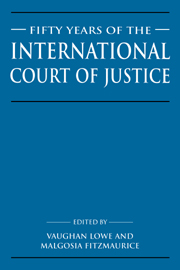Book contents
- Frontmatter
- Contents
- List of contributors
- Preface
- List of abbreviations
- Sir Robert Yewdall Jennings, by Vaughan Lowe
- List of publications of Sir Robert Jennings
- Table of cases
- Part I The International Court of Justice
- 1 The International Court as a world court
- 2 The International Court and the voice of justice
- 3 The London Committee and the statute of the International Court of Justice
- Part II The sources and evidences of international law
- Part III Substance of international law
- Part IV Procedural aspects of the work of the International Court of Justice
- Part V The International Court of Justice and the United Nations
- Index
1 - The International Court as a world court
Published online by Cambridge University Press: 02 November 2009
- Frontmatter
- Contents
- List of contributors
- Preface
- List of abbreviations
- Sir Robert Yewdall Jennings, by Vaughan Lowe
- List of publications of Sir Robert Jennings
- Table of cases
- Part I The International Court of Justice
- 1 The International Court as a world court
- 2 The International Court and the voice of justice
- 3 The London Committee and the statute of the International Court of Justice
- Part II The sources and evidences of international law
- Part III Substance of international law
- Part IV Procedural aspects of the work of the International Court of Justice
- Part V The International Court of Justice and the United Nations
- Index
Summary
Having had the privilege of being the pupil of Professor R. Y. Jennings, as he then was, and the beneficiary of his guidance and friendship for over a third of a century, and the even rarer privilege of serving beside him as counsel before the International Court of Justice, then as judge ad hoc during his presidency of the Court, I was intrigued by his occasional use of ‘World Court’ to refer to the ICJ.
Indeed, this reference to the ICJ (and the Permanent Court of International Justice before it) as ‘the World Court’, which probably goes back to Judge Manley O. Hudson and which is current in legal literature in English, is unknown in other languages such as French, Italian, Spanish or for that matter Arabic. It raises in the mind of the non-common law jurist the following query: in what sense and what ways can the International Court be considered a ‘World Court’?
THE INTERNATIONAL COURT AS A WORLD-WIDE COURT
The first meaning that suggests itself is that it is a court of and for the whole world. As such, it is expected to be universalist in its composition, outlook and vocation, truly representing and at the service of the international community in its entirety, and not dominated by the legal or social culture or special interests of any segment thereof. This in turn would ensure that the Court and its judgments command the confidence of all the nations of the world.
- Type
- Chapter
- Information
- Fifty Years of the International Court of JusticeEssays in Honour of Sir Robert Jennings, pp. 3 - 16Publisher: Cambridge University PressPrint publication year: 1996
- 15
- Cited by



